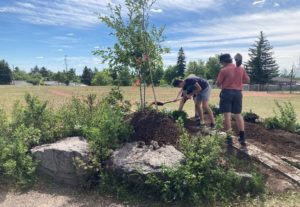2021, Calgary, AB, Canada
When Will, a grade 9 student from St. James School in Calgary, Alberta learned that road transportation produces a majority of CO2 emissions in Canada, he decided to take action with his “Fast-Growing Dense Mini Forest” project. Noticing that his school lacked natural green space, and acknowledging his school’s proximity to two major highways, Will proposed a plan to improve his school’s native gardens by planting more fast-growing and resilient trees and shrubs to help combat CO2 emissions while also restoring biodiversity.
school’s native gardens by planting more fast-growing and resilient trees and shrubs to help combat CO2 emissions while also restoring biodiversity.
Will’s research into these miniature forests showed that they can grow 10 times faster and become 30 times denser than a traditionally planted forest. Additionally, these mini-forests can absorb significantly more carbon while creating prime, natural habitat that could attract hundreds of wildlife species. With this in mind, Will proposed the planting of dozens of tree and shrub saplings in a small area of his school yard in an effort to fight climate change and improve life on land.
His project gained outstanding support from his school and community. St. James School is a long-time CFOW participant that have spearheaded multiple initiatives, including running their own composting program (which is being enhanced to involve more students). Will and many of his fellow classmates began to take action. Students have already planted over 100 tree saplings and seeds in their school yard, and have been watering, weeding, replacing mulch, and repairing their natural area in hopes to establish their very own miniature urban forest. Will’s project has allowed his community to learn more about their environment and watershed, and they hope to inspire more schools to follow suit and plant more native vegetation in their schoolyard to support our urban ecosystems.